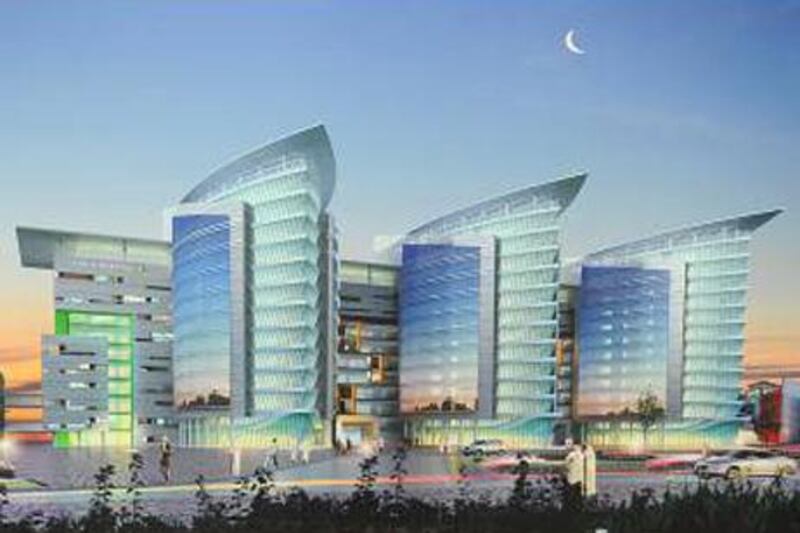DUBAI // A Dh3 billion revamp of Rashid Hospital, 40 new primary healthcare centres and three new hospitals are among a raft of measures in a 12-year masterplan to boost health care in Dubai and turn the emirate into a hub for medical tourism.
"The expansion plans have been designed to provide state-of-the-art services to the population of Dubai as well as visitors who come to the emirate for medical tourism," said Essa Al Maidoor, director general of Dubai Health Authority.
The project centres on the multibillion-dirham revamp of Rashid Hospital, which specialises in emergency, trauma, critical and ambulatory care, and on development of the surrounding area.
It will include six new specialised health centres, a four-star and a five-star hotel, villas and flats for more than 5,400 members of staff and their families and a mosque with a capacity for 150 worshippers.
The new 100,000 square metre site, which will be built using green building standards, will have three towers inspired by Sheikh Mohammed bin Rashid's three-finger salute, in which the fingers represent victory, triumph and love.
The existing hospital, which will eventually be demolished, has 599 beds. Each new seven-storey tower will have 300, giving a total capacity of 900, and will include six VIP rooms and seven royal suites.
The hospital's trauma centre will be expanded over the next two years to accommodate 116 beds and its outpatient facility will expand to 160 treatment rooms.
The masterplan includes new centres for heart, cancer and kidney patients, among others, and a dedicated Dh38 million outpatient building to reduce the pressure on hospitals.
The project also includes plans for a new rehabilitation centre, which will have 500 beds and will be flanked by the two hotels, which will have 1,000 rooms and 20 chalets.
In addition, about 6,500 car park spaces will be created on the site.
The masterplan also envisages three new hospitals: Sheikh Mohammad bin Rashid Hospital on Sheikh Mohammed bin Zayed Road, Al Maktoum Hospital in Jebel Ali's Al Maktoum Airport area, and Al Khawaneej Hospital.
Other projects include a souq and expansion of the emirate's only centre for the elderly in Al Mamzar to include a heritage market, mosque and diagnostic centre.
"The strategy has been chalked out taking into consideration the expected population growth of Dubai," said Mr Al Maidoor.
"The expansion plans not only fulfil the main criteria of provision of excellent healthcare facilities and health infrastructure but also take into consideration landscaping, leisure activities, hotel accommodation for medical tourists, staff accommodation etc.
"All these aspects ensure we have taken a 360-degree view of the requirements of patients, their families, staff members and medical tourists."
Mr Al Maidoor said the four pillars of the strategy were prevention and awareness, easy access to health services, quality and investment, and competitiveness.
He said the project was in line with a strategy to have all hospitals within a 12-kilometre radius of all catchment areas and all healthcare centres within a five-kilometre radius.
The masterplan was approved by Sheikh Mohammed, the Vice President and Ruler of Dubai, on a visit to DHA headquarters last week.
"I think it is one of the best things to happen in Dubai," said Dr Ajit Kumar, a neurologist and medical director of NMC Speciality Hospital.
"This is because I think there is still a need for more health services and, being such an attractive tourist hub with all the infrastructure, it would attract patients from the regional countries and maybe from afar as well.
"It could develop as a very good centre for medical tourism. It has already a beautiful infrastructure in place, a wonderful, huge airport, excellent roads, hotels, an excellent public-transport system, a very friendly city, so it has got everything made for it as far as medical tourism is concerned."
Dr Pietie Loubser, chief clinical officer of Mediclinic Middle East, said the plans would meet the rising needs of an ever-increasing population.
"These important initiatives will improve access to health care and also ensure delivery of the highest quality of care for residents, as well as those who come to Dubai for medical treatment."
Dr Khaliq Raza Khan, of the Ismail Medical Centre, described it as "a golden opportunity for medical tourism".
"This is a positive step for Dubai health care and will benefit not only the medical industry but other industries, too," he said. "It is a wonderful thing."
Customer care is at the core of the new 12-year strategy, Mr Al Maidoor said. "Patients and their families need our utmost care and compassion, and excellence in healthcare services and customer care must go hand-in-hand," he told DHA staff.
"I cannot emphasise enough the importance of the key role that all healthcare workers - doctors, nurses and technicians - play in protecting the health of the public.
"Medicine is a noble profession and we are all lucky to be in a position where we can, through our individual roles, take care of the health of our community members. For us all, going forward, customer care has to be priority."
DHA is launching a live customer satisfaction feedback mechanism in each hospital.
Before patients leave a DHA-run hospital they will be able to signal whether they have been happy with the service they have received by a "happy" or "unhappy" button.
The results will be shown in real time across all DHA hospitals and primary healthcare centres.
"The thought process behind this service is to further empower customers to express their opinion and let them be the judge of the services provided by the DHA," said Mr Al Maidoor.





